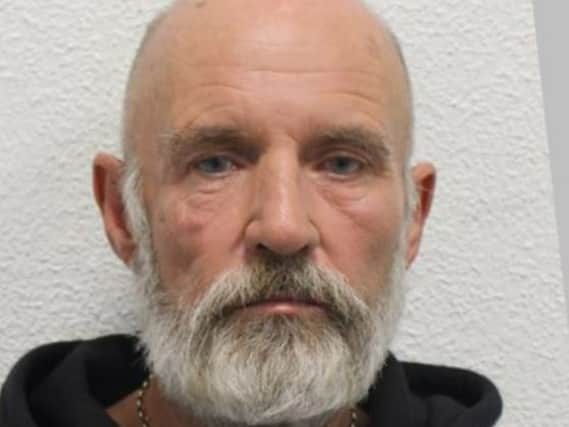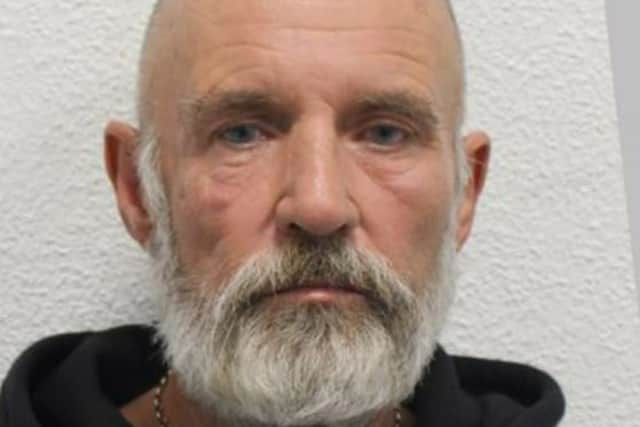'Fantasist’ killer Paul Bryan who stole identity of dead man found guilty of murder after 39 years on the run


A killer who stole the identity of a dead man while travelling around Europe to evade justice has finally been found guilty of murder - after 39 years. Enforcer Paul Bryan was 22 when he fatally stabbed 62-year-old Roman Szalajko at his flat in Kennington, south London, in February 1984.
He then took the identity of a dead Welshman with the same name to lead a new life while travelling around Portugal, Crete, Spain and France. Bryan, who was rejected by the army, became a suspect when his fingerprints were identified from a bottle at the scene during a cold case review in 2013.
Advertisement
Hide AdAdvertisement
Hide AdHis arrest came thanks to a dedicated Scotland Yard detective, who spent over a decade hunting him down, finally catching him as he disembarked from a plane in Portugal. The defendant, originally from Hammersmith, west London, admitted having a false passport and was found guilty of murder on Tuesday (November 7) following a trial at the Old Bailey.
Detective Sergeant Quinn Cutler said he was “personally very satisfied” at the outcome, especially for the victim’s family who have spent almost 40 years without any closure. Bryan, he said, was a “fantasist” who lived off his wife’s earnings as a tour operator before returning to the UK after her death.
The Lewisham-based officer told PA: “He has lived the majority of his life as another person. He pretends to be American, he pretends to have been in the Army and being Awol. Nothing he says is true and it’s very hard to understand what he has actually done for the last 40 years. What we know he has done is be involved in the murder of Roman Szalajko back in 1984 from the very strong forensics my colleagues in the forensic command were able to identify.”
He said the evidence suggested Bryan had been a “heavy” or “minder” and had killed Mr Szalajko while enforcing a debt or getting paperwork after a property deal went wrong. The court had heard the Polish victim, a divorced father of three, was known to be “secretive” and a gambler who kept large amounts of cash at his flat, which has since been demolished.
Advertisement
Hide AdAdvertisement
Hide AdOn the morning of February 7, 1984, Mr Szalajko was on the phone to a builder friend, Michael Peddubriwny, when he broke off, saying in Polish: “Excuse me a moment, there’s someone at the door.” As the line was left open, Mr Peddubriwny heard the victim say loudly in English: “What do you want? Help! Help!”
Mr Peddubriwny shouted down the phone: “Roman, what’s going on?” but the line went dead, having been deliberately cut. He called 999 in a “panic” and two police officers went to the flat, where they found Mr Szalajko slumped in a chair in the living room with a fatal stab wound to his stomach.


His body was still warm to the touch, there was evidence of a search, and the constables noticed clumps of the victim’s hair had been pulled out and thrown on the floor. Other evidence collected from the scene and stored included fingerprints, the victim’s clothes, his telephone and £1,000 in Spanish pesetas.
The case went unsolved until the cold case review led to the identification of Bryan’s fingerprints on a “Polish mead” bottle in the victim’s wardrobe. Mr Cutler then picked up a paper trail and scraps of evidence to track down the suspect, who appeared to have vanished in the late 1980s.
Advertisement
Hide AdAdvertisement
Hide AdDC Cutler also discovered that the murderer, Paul Bryan, had left no employment or tax records since the 1980s, and he lacked a passport and a driver's licence, which made him nearly untraceable. However, after Bryan's arrest in London in 1997 for a minor drug offence, where he was in the company of a woman named Sylvia Bryan, Cutler used genealogy to determine that she was his wife.


He tracked Paul Bryan's marriage certificate and found a different date of birth, 1955 instead of 1961, indicating that the real Paul Bryan with the 1955 birthdate was deceased. Somehow, Bryan had assumed this deceased man's identity, obtaining a passport and a driver's licence and living in Portugal with Sylvia Bryan.
Advanced forensic tests were then conducted, matching cells from Bryan's late mother's hairbrush to traces on the victim's vest and hair, establishing a familial DNA match. In a twist of fate, Bryan applied for a new passport and returned to the UK voluntarily in November of the previous year. This provided an opportunity to collect his DNA and confirm his involvement in the 1984 murder of Roman Szalajko.
Upon his arrest, Bryan initially attempted to maintain his false identity. He denied the fingerprints at the murder scene, dismissed his DNA evidence, and feigned amnesia during the trial. The jury, however, rejected his claims and found him guilty. Judge Nigel Lickley KC remanded Bryan into custody until his sentencing scheduled for December 8.
